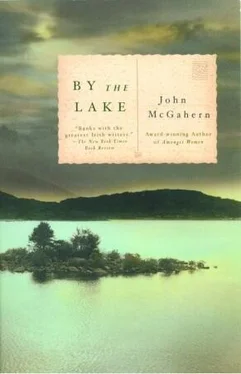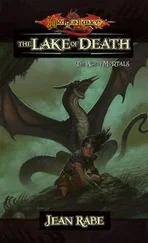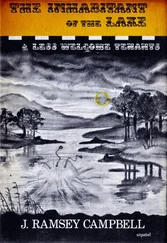The car was a small, modified car with a disabled person’s sign. They entered the house after knocking. Inside, all the clocks were back on the walls and striking. The clockmaker was laboriously manoeuvring himself into place with an aluminium crutch along the edge of a table to make adjustments to the clock beside the unlit stove. Jamesie stood close by but made no attempt to help because of the clockmaker’s pride. He had a beautiful, sensitive face with dark hair and an emotional smile. “That’ll do for now,” he said studiously when he made the adjustments, and swinging himself free of the table with surprising quickness he was soon in the armchair. Mary poured tea.
“I think that’s all we can do for now. I’ll be back this day week to see how they are doing.” He had a precise, careful way of speaking.
“You were great,” Mary praised. “It’s great to have the house near normal again.”
Suddenly several clocks struck the half-hour together but the clockmaker held up a spoon for silence and smiled a knowing smile when a clock struck late. “I knew that boy wasn’t right but we’ll know more next week,” he smiled winningly. “I think there’s another one as well.”
“This man here sold John Quinn his wife’s wedding ring,” Jamesie said as if he could contain this news no longer.
“I sell jewellery,” the clockmaker said in his precise way. “A lot of people know about me by now. They come to the house. John Quinn came with his wife-to-be to buy her wedding ring. The ring was a thin gold band and cost a hundred pounds. They tried several rings and that was the ring she wanted. He paid in cash.”
“Wait. There’s more,” Jamesie said.
“A few days after they ran him out of Westmeath he was back at the house with the wedding ring,” the clockmaker said disapprovingly. “He wanted his money back for the ring.”
“She probably threw it at him,” Mary said.
“If she didn’t you can be sure he asked for it back,” Jamesie added.
“In all my time I’ve never had a wedding ring returned. I told him it wasn’t done, but he still wanted his money. To be rid of him, after making sure it was the right ring, I offered him fifty pounds. ‘We’ll split the difference,’ he said. I raised the fifty to sixty pounds and told him he could take it or leave it and he took the sixty pounds. I thought it’d be the last I’d see of him.”
“Wait!” Jamesie raised his hand.
“Only last week he was back. We were all in bed but he kept knocking till my brother went and opened the door. I told Michael on no account to let him into the house and to make him wait outside. What he wanted was to tell me that he had bought a calf with the sixty pounds and sold the calf that very night in the mart for a hundred and thirty. The ring had done better on the calf than on the woman. ‘Could the news not have waited till morning?’ I asked. He said he wouldn’t be able to sleep till he’d told me how well the ring had done.”
“John was back winning. That’s all he wanted people to know,” Jamesie said. “That’s all he cared or thought about.”
“I’ll just wait till the clocks strike. It’ll be nine in a few minutes,” the clockmaker said.
All the clocks throughout the house, magically, seemed to strike the hour together until, with a knowing smile, the clockmaker waited until one of them struck up on its own a few seconds after the others, and then one other. Then all the clocks continued ticking away quietly again.
The clockmaker smiled and made a note on the back of an envelope and gave it to Mary to keep. “I’ll be back this day week. It shouldn’t take long then and we’ll have all the boys striking together for sure.”
Jamesie and Mary saw him out to the car, Jamesie carrying his small tool box. They stayed with him while he stowed away his crutches and levered himself in behind the wheel and drove away. Jamesie was first to return to the house, Mary closing in her brown hens for the night.
“That little man is great. He can nearly make the clocks talk. We thought he’d be finished with them by now but he’s most particular. All his people were decent and gave him great seeing to. He didn’t let it go to waste,” he said as he went and took a fresh bottle of Powers from its brown paper bag in the press.
“I suppose he has the bottle of whiskey out already,” Mary teased him when she returned, but no one this evening wanted more than a ritual glass.
“John Quinn is still winning,” Jamesie said as they drank, and reached across, pretending to be about to eject the terrier from the armchair. The terrier stripped his teeth at the sight of the great hovering hand, and then Jamesie took his hand away.
“If someone is winning, then someone else is losing,” Kate said.
“What are we doing?” Mary asked.
“Standing put while going past,” Ruttledge laughed.
“You should have been a priest.”
“I nearly was,” Ruttledge said.
“Sleepy fox,” Jamesie cried out instinctively. “Two arms and both of them as long as one another.”
“Did you ever hear such rambling?” Mary said as all the clocks struck ten, and then they waited until the two struck late. “Do you think will he ever be able to get them right?”
“If the little man isn’t able — nobody will.”
“I suppose they should be sold or thrown out and new clocks bought but they’ll be kept for our time,” Jamesie said superstitiously.
“They’d have a tale to tell if they could speak,” Mary said.
“Wise. No daws. Never got into trouble,” Jamesie said. “All they said was tick-tock. Tick-tock. Pass no heed. Tick-tock. Say no bad. Tick-tock. Turn a blind eye. Tick-tock. Get into no trouble. Tick-tock. Put the hand over. Tick-tock. Don’t press too hard. Tick-tock. Ask why not but never why. Cleverer than the wisest that ever tried.” He cheered, but grumbled when no one wanted a second whiskey, and capped and put away the bottle without tipping a measure into his own glass. “Ye are no good. There was people going once who wouldn’t be afraid.”
They walked out into the clear night. The hens clucked on their roosts in the small house. The path was clear, winding round by the edges of the fields. The pair of dogs that had clung jealously to their chairs all through the evening now started to hunt birds in the whitethorn hedges, their impatient barking answered by the alarmed racket of blackbirds they had disturbed. The two women lagged behind the men. Jamesie was silent as they walked.
“Do you think is there an afterlife?” His question startled Ruttledge because it was so uncharacteristic.
“No. I don’t believe there is but I have no way of knowing.”
“You mean we’re just like dog or cat or a cow or a leaf — that when we are dead we are just dead?”
“More or less,” Ruttledge answered carefully. “I don’t know from what source life comes, other than out of nature, or for what purpose. I suppose it’s not unreasonable to think that we go back into whatever meaning we came from. Why do you ask?”
“I’ve been thinking about it a lot since Johnny went.”
“What do you think?”
“I think if there’s a hell and heaven that one or other or both of the places are going to be vastly overcrowded,” he said with surprising heaviness. Even his walk and tone had changed.
“I suspect hell and heaven and purgatory — even eternity — all come from our experience of life and may have nothing to do with anything else once we cross to the other side,” Ruttledge said briskly, anxious to hide his affectionate amusement at Jamesie’s display of weight and gravity — he who was so important because of his wondrous lightness.
“At the same time you wouldn’t want to leave yourself too caught out in case you found there was something there when you did cross over,” Jamesie said doubtfully. “They complain that poor Father Conroy is very hard on money but he did everything, everything a person could ever do for Johnny. He was in the house less than an hour after we found him slumped in the chair, gave him the last sacraments, received him in the Church, said the funeral Mass and preached a most beautiful — most beautiful sermon. In the sermon he said that Johnny belonged to a whole generation of Irish people who had been forced into England to earn their bread. In Johnny’s case he was wrong but he was right in the case of nearly every other person that left from around. While there were some who prospered and did well there were others who experienced great hardship and there were many that fell by the wayside. These people forced into England through no fault of their own were often looked down on — most unjustly looked down upon — by some whose only good was that they managed to remain at home with little cause to look down on anybody. It’s always the meanest and poorest sorts who have the need to look down. Everybody said it was a mighty sermon and longer than he gave for the TD’s mother. At the grave he blessed the coffin and said the prayers. And do you know how much he charged for all that?”
Читать дальше












